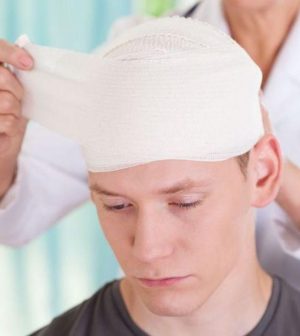- Recognizing the Signs of Hypothyroidism
- 10 Strategies to Overcome Insomnia
- Could Artificial Sweeteners Be Aging the Brain Faster?
- Techniques for Soothing Your Nervous System
- Does the Water in Your House Smell Funny? Here’s Why
- Can a Daily Dose of Apple Cider Vinegar Actually Aid Weight Loss?
- 6 Health Beverages That Can Actually Spike Your Blood Sugar
- Treatment Options for Social Anxiety Disorder
- Understanding the Connection Between Anxiety and Depression
- How Daily Prunes Can Influence Cholesterol and Inflammation
Strict Rest Not Recommended After Sports-Linked Concussion, Experts Say

Strict rest isn’t advised after athletes suffer a concussion because it could slow their recovery, an updated consensus statement from a U.S. expert panel says.
Most adult athletes fully recover within two weeks and children within four, according to the statement published June 15 in the British Journal of Sports Medicine.
The number and severity of initial symptoms are the best indicators of how long it will take a patient to recover.
“Most athletes who have been concussed will get better, and will be able to return to play,” said Dr. Margot Putukian, a member of the panel that drew up the new statement.
“Each injury is unique and will have its own timeline. But athletes should take comfort in knowing that there are treatments out there, and there are steps they can take to aid their own recovery,” she added in a news release.
Factors that may prolong or complicate recovery include younger age; previous concussions; loss of consciousness for more than a minute; and preexisting conditions such as migraine, ADHD, learning disabilities, depression, anxiety/panic attacks, and motion sickness, the statement says.
Progressive moderate aerobic exercise within the first week helps recovery. Most athletes don’t require over-the-counter and/or prescription medications for acute concussion symptoms.
The statement says there’s no evidence to suggest that “nutraceuticals” help prevent or treat concussion. Nutraceuticals are foods or part of foods that provide medicinal or health benefits.
The statement, developed by a team from six major professional associations, updates a 2011 statement on concussion management.
It says persistent symptoms such as fatigue, headache and anxiety, aren’t usually caused by a single factor, but likely result from the “complex interplay” between the physical and mental effects of concussion and underlying conditions.
In these cases, treatment should focus on the particular symptom. Examples of treatment include cognitive behavioral therapy and/or lifestyle changes to sleep, nutrition and hydration.
The consensus statement was developed by the Team Physician Consensus Conference (TPCC). It’s an annual project-based alliance of six major professional associations: the American Academy of Family Physicians, American Academy of Orthopaedic Surgeons, American College of Sports Medicine, American Medical Society for Sports Medicine, American Orthopaedic Society for Sports Medicine and
American Osteopathic Academy of Sports Medicine.
Each year, between 1 million and 1.8 million concussions occur among Americans under age 18. Around 400,000 occur in high school athletes.
The new statement notes that concussion symptoms aren’t specific and that there are no reliable methods of diagnosis — such as blood tests, genetic tests or standard imaging techniques.
As a result, the actual number of sports-related concussions isn’t known.
More information
The American College of Sports Medicine has more on sports concussions.
SOURCE: British Journal of Sports Medicine, news release, June 15, 2021
Source: HealthDay
Copyright © 2026 HealthDay. All rights reserved.










